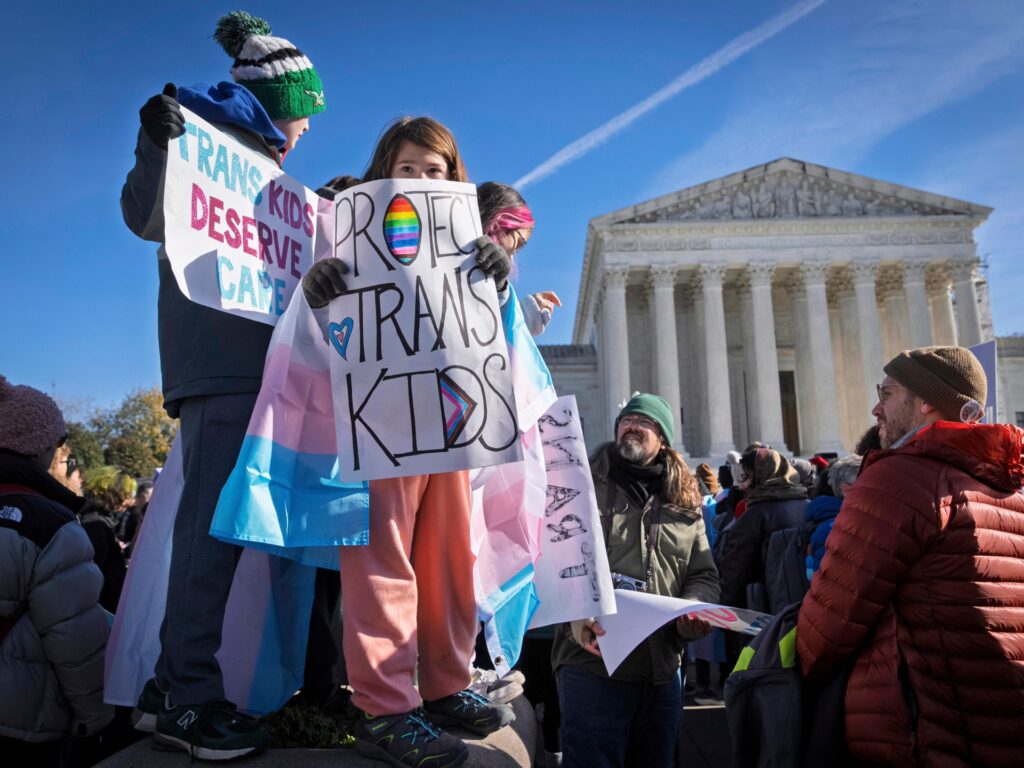The United States Supreme Court has ruled that a Tennessee law barring puberty blockers and hormone therapies for transgender minors does not violate the US Constitution and can therefore remain in effect.
Wednesday’s decision was split along ideological lines, with the high court’s six conservative judges siding with Tennessee and its three left-leaning judges joining together for a dissent.
Chief Justice John Roberts wrote the opinion for the majority. In it, he explained that the plaintiffs — three transgender minors, their parents and a doctor — had not successfully shown a violation of the Constitution’s 14th Amendment, which guarantees equal protection under the law.
The plaintiffs had sought to lift the ban, arguing that Tennessee’s law, known as SB1, discriminated against them based on their sex and gender.
Roberts, however, disagreed. He pointed out that the ban applies to young men and women equally.
“SB1 does not mask sex-based classifications,” he wrote. “The law does not prohibit conduct for one sex that it permits for the other. Under SB1, no minor may be administered puberty blockers or hormones to treat gender dysphoria, gender identity disorder, or gender incongruence.”
Roberts also noted that puberty blockers continue to be available under the Tennessee law to treat congenital defects, early puberty, disease or injury among children. That application likewise was allowed regardless of sex, he wrote.
“SB1 does not exclude any individual from medical treatments on the basis of transgender status but rather removes one set of diagnoses — gender dysphoria, gender identity disorder, and gender incongruence — from the range of treatable conditions,” Roberts said.
Transgender youth are sometimes prescribed hormone inhibitors to delay the onset of puberty, thereby stopping the development of secondary sexual characteristics like breasts, deepening voices and facial hair.
LGBTQ advocates say such gender-affirming care is essential in some cases to alleviate the stress of such changes and reduce the potential need for surgeries later on. Puberty blockers are widely considered to be safe and their effects temporary.
But Roberts noted that some medical providers are pushing for more research into the long-term effects of the drugs and pointing to “open questions” in the medical field.
“Health authorities in a number of European countries have raised significant concerns regarding the potential harms associated with using puberty blockers and hormones to treat transgender minors,” Roberts wrote.
“Recent developments only underscore the need for legislative flexibility in this area,” he continued.
The majority’s opinion was met by a fierce dissent, written by Justice Sonia Sotomayor. She pointed out that puberty blockers can save lives, given that transgender youth face higher rates of suicide, self-harm and bullying.
“The majority contorts logic and precedent to say otherwise, inexplicably declaring it must uphold Tennessee’s categorical ban on lifesaving medical treatment so long as ‘any reasonably conceivable state of facts’ might justify it,” Sotomayor wrote.
“By retreating from meaningful judicial review exactly where it matters most, the Court abandons transgender children and their families to political whims. In sadness, I dissent.”
She emphasised that the consensus in the US medical community is that puberty blockers are “appropriate and medically necessary” in cases of a comprehensive and clinical diagnosis of gender dysphoria.
“Transgender adolescents’ access to hormones and puberty blockers (known as gender-affirming care) is not a matter of mere cosmetic preference,” Sotomayor said. “To the contrary, access to care can be a question of life or death.”
She questioned why Tennessee lawmakers should have the power to regulate a medical decision — and why puberty blockers could still be used to address issues like unwanted facial hair among teenage girls but not gender affirmation among transgender youth.
“Tennessee’s ban applies no matter what the minor’s parents and doctors think, with no regard for the severity of
the minor’s mental health conditions or the extent to which treatment is medically necessary for an individual child,” Sotomayor said.
Wednesday’s decision comes at a precarious time for the transgender community in the US.
Since returning to office for a second term in January, US President Donald Trump has taken steps to limit the rights of transgender people. On his very first day back in the White House, the Republican leader issued an executive order announcing the federal government would only recognise two sexes, male and female.
Days later, on January 27, he issued another executive order, effectively setting the stage for a ban on transgender troops in the military. Trump denounced transgender people as “expressing a false ‘gender identity’” and said their identity “conflicts with a soldier’s commitment to an honorable, truthful, and disciplined lifestyle”.
The Supreme Court upheld that ban as well. June 6 marked an initial deadline for transgender troops to self-identify and leave the military voluntarily.
In addition, Trump has said his administration will withhold federal funds from schools that allow transgender girls and women to participate in women’s sports. That decision has led to clashes with states like Maine, where Democratic Governor Janet Mills has pledged to stand up to Trump.
The fight over Tennessee’s ban on puberty blockers arrives amid a wave of similar legislation: According to the American Civil Liberties Union (ACLU), some 25 states have bans on gender-affirming healthcare for transgender youth.
The group estimates that those laws leave around 100,000 transgender minors without access to medical care they may need.
The ban the Supreme Court weighed on Wednesday had initially faced an injunction from a lower court, but the Sixth Circuit Court of Appeals lifted the injunction pending an appeal.
The ACLU called the Supreme Court’s decision a setback but pledged to continue filing legal challenges. In a statementit noted that the Supreme Court had not overturned the wider precedent that discriminating against transgender people is illegal.
“Today’s ruling is a devastating loss for transgender people, our families, and everyone who cares about the Constitution,” said Chase Strangio, a co-director for the ACLU’s LGBTQ and HIV Project.
“We are as determined as ever to fight for the dignity and equality of every transgender person.”


